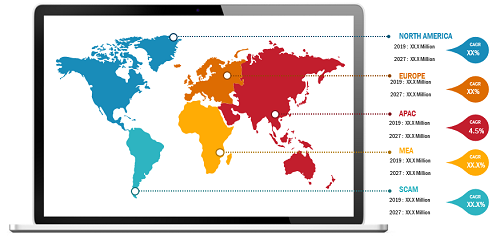According to our new market research study on “Quantitative Structure-Activity Relationship (QSAR) Market Forecast to 2027 – COVID-19 Impact and Global Analysis – by Application and Industry, ” the market is expected to reach US$ 1,888.5 million in 2027 from US$ 1,388.1 million in 2019; it is estimated to grow at a CAGR of 4.0% from 2020 to 2027. The market growth is mainly attributed to the increasing adoption rate of modeling tools in drug discovery and rising investments for drug discovery. However, low adoption rate of the technique in emerging countries is hindering the quantitative structure-activity relationship market growth.
Based on application, the quantitative structure-activity relationship market is segmented into drug discovery, molecular modeling, chemical screening, regulatory and decision-making, and other applications. In 2019, the drug discovery segment accounted for the largest share, and it is further expected to register the highest CAGR in the market during the forecast period. The drug discovery process often involves the use of QSAR to identify chemical structures that could have good inhibitory effects on specific targets and have low toxicity (non-specific activity). According to Lipinski’s Rule of Five, the prediction of partition coefficient log P is an important measure used in identifying “drug likeness.”
Get sample PDF Report Copy at: https://www.theinsightpartners.com/sample/TIPRE00018665/
Protoqsar Sl., Intertek Group Plc, Bibra Toxicology Advice And Consulting Ltd, Covance Inc. (Labcorp), Latham Biopharm Group, Nsf International, Creative Biolabs, Qsar Lab Sp. Z O, and Dassault Systèmes are among the companies operating in the quantitative structure-activity relationship market.
QSARs have a substantial role in toxicity prediction, drug design, and environmental fate modeling of food & beverages, chemicals, and pharmaceuticals. Moreover, predictive QSAR models are used by different regulatory agencies to do the estimation of chemical, physical, and biological parameters of chemicals with the helps of specific applications that precisely performs the tasks of decision-making contexts in chemical safety assessment. Ineffective drug targets are the main reason leading to the failure of various late-stage clinical trials. With the introduction of artificial intelligence (AI) in healthcare, numerous pharmaceutical companies have made investments in partnership agreements with software-based companies to develop better healthcare tools and technologies for avoiding drug failures. For instance, Pfizer is using IBM Watson, a machine learning system, to enhance its search for immuno-oncology drugs. Sanofi has collaborated with Exscientia’s artificial-intelligence (AI) platform, a UK-based start-up, to discover therapies to cure metabolic diseases. Genentech is enhancing its search for cancer treatments by using an AI-based system offered by GNS Healthcare. Therefore, most of the companies engaged in drug discovery are using AI tools to screen and identify compounds, calculate their potential, and minimize drug interactions that may cause issues later.
With the introduction of AI in the pharmaceuticals and healthcare sectors, the companies in these sectors are investing in collaborations with AI players for the development of better and advanced healthcare tools, which, in turn facilitates better identification of drug targets and aids in designing new drug candidates. Thus, a rise in number of partnerships between pharmaceutical industries and AI companies, and government organizations has been witnessed on the global scale. For instance, in 2019, the Royal Free London NHS Foundation Trust entered into a five-year partnership with DeepMind Technologies (Google), wherein the company is expected to assist the NHS in discovering therapies for the management of acute kidney injuries. The 100,000 Genomes Project of the UK is a global project that utilizes data and AI from NHS patients with rare diseases. The project also has Roche, Merck, and Biogen as partners.
The COVID-19 pandemic is causing massive disruptions in supply chains, consumer markets, and economies across the world. However, the high demand for promising tools for rapid and accurate drugs and vaccine development has boosted the demand for QSAR, thereby fueling the market growth.
The Report Segments Quantitative Structure-Activity Relationship Market as Follows:
By Application
- Drug Discovery
- Molecular Modelling
- Chemical Screening
- Regulatory and Decision-Making
- Other Applications
By Industry
- Pharmaceuticals
- Cosmetics
- Environmental
- Food and Beverage
Purchase a copy of the report @ https://www.theinsightpartners.com/buy/TIPRE00018665/
Media Contact
Company Name: The Insight Partners
Contact Person: Sameer Joshi
Email: Send Email
Phone: +1-646-491-9876
City: Pune
State: Maharashtra
Country: India
Website: https://www.theinsightpartners.com/

